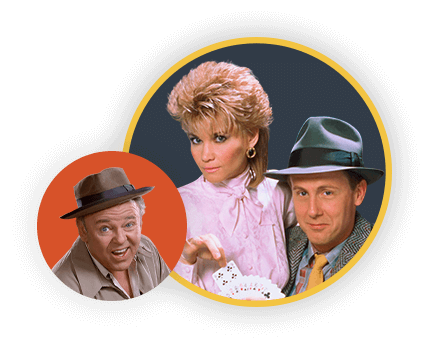Full House's theme song composer wanted to be the next Bob Dylan

When an episode of Full House starts, a chorus of singers comes in sighing "ah-ah-ah-ah" before a groovy voice asks, "Whatever happened to predictability?"
It’s likely that audiences got about this far before wanting to chime in and sing along with the massively popular song.
"Everywhere You Look" is one of the Nineties’ most iconic theme songs, written by Jesse Frederick, one of the late Eighties/early Nineties’ most prolific theme song composers.
Frederick wrote the themes of just about every ABC sitcom featured on its popular TGI Friday lineup, including Full House, Family Matters, Step By Step and Perfect Strangers.
He was on a roll, but according to Frederick, he never planned to pen a single theme song.
Instead, Frederick wanted to be the next Bob Dylan.
In the Sixties, he went so far as hanging around members of The Band just to get close to his goal.
"I used to hang out in Woodstock," Frederick told The Associated Press in 1990. "I was pals with The Band. I was trying to be Bob Dylan."
A young songwriter, there likely was no bigger ambition than to follow in Bob Dylan’s footsteps, and to that end, Frederick even put out a self-titled album in 1971.
That self-titled album was produced by rocker Todd Rundgren, and according to Frederick, we have Rundgren to thank for every note of the catchy Full House theme song.
"Todd Rundgren showed me that there was an art to writing a hit single, an art to condensing a song," Frederick said.
Although Frederick never wrote a hit song, he took what he learned from Rundgren and applied it when TV and movie studios started coming around, looking for theme songs.
"With a theme song, it’s even more challenging," Frederick said, comparing theme songs to hit songs.
By the end of the 1970s, Frederick became known in these circles as someone who could produce a catchy song that really hooked audiences.
At that time he felt that "music is music," and he no longer wanted to be Bob Dylan. He realized he was on a different path, and even though it wasn’t the fame he hoped for, it was still a lot of success for a songwriter.
"Millions of people hear your music every week," Frederick said of writing TV theme songs. "And you’re generously paid. But somehow you’re not quite as cool as you’d be if you did something else."
When writing theme songs, Frederick liked to work closely with producers, who would tell him the style of music they wanted and the general theme of the show.
For example, he said that for Perfect Strangers, producers "wanted the theme to sound contemporary, but not too rock & roll. They wanted something real positive. They said, ‘It’s about winning'."
His Perfect Strangers theme song achieved a cult fandom among TV fans, too, and in 1987, at least one fan decided he loved it so much, he wanted to hear that song at his wedding.
"Do you know where I could get the song that’s sung on Perfect Strangers?" the groom’s best friend wrote into the TV column "Ask Pat" in 1987. "My friend is getting married and would like the tune played at his wedding. As his best man, I’m trying to find it."
The TV writer told the best man that Frederick’s theme song was never recorded and that it wasn’t available on sheet music.
The only way to hear it was to record it from his own TV, or perhaps, "in view of the special circumstances, you might throw yourself on the mercies of Lorimar Telepictures and write its Music Department."
We’ll never know if the groom got his special wish, but it’s clear that Frederick’s theme song was deemed to be a winner by fans who wanted to hear it during their own defining life moments.
After his success in the 1990s, Frederick has continued working in the music department on movies and TV shows. He also went on record in the 2000s expressing his disappointment at a TV trend moving away from original compositions toward TV with soundtracks used to launch independent musicians to fame.
He liked it better when theme songs were hatched just for a TV show, using a process he perfected with the help of Todd Rundgren.
"Ironically, there’s an intense process to come up with these songs, and they all come out sounding kind of the same," Frederick said.




